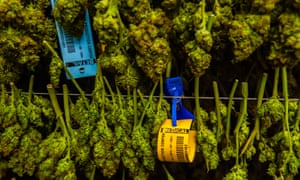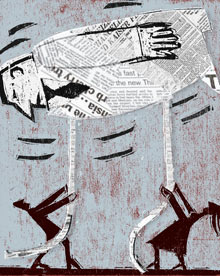
‘To enable Harry Anslinger to keep his army of drug enforcers [the Untouchables], he created a new drug threat, cannabis, which he called marijuana to make it sound more Mexican.’ Photograph: Tomas Rodriguez/Corbis
David Nutt in The Guardian
This is, of course, a flawed question but one that illustrates a major paradox in the UK and international laws on drugs. Some drugs – such as alcohol, caffeine and nicotine – are legal, whereas others – such as cannabis, cocaine and opium – are not. This has not always been the case.
In the 19th century extracts of these three now-illegal drugs were legal in the UK, and were sold in pharmacies and even corner shops. Queen Victoria’s physician was a great proponent of the value of tincture of cannabis and the monarch is reputed to have used it to counteract the pain of menstrual periods and childbirth. Now it is denied to people with severe enduring spasticity and pain from neurological disorders and cancer. Why?
David Nutt in The Guardian
This is, of course, a flawed question but one that illustrates a major paradox in the UK and international laws on drugs. Some drugs – such as alcohol, caffeine and nicotine – are legal, whereas others – such as cannabis, cocaine and opium – are not. This has not always been the case.
In the 19th century extracts of these three now-illegal drugs were legal in the UK, and were sold in pharmacies and even corner shops. Queen Victoria’s physician was a great proponent of the value of tincture of cannabis and the monarch is reputed to have used it to counteract the pain of menstrual periods and childbirth. Now it is denied to people with severe enduring spasticity and pain from neurological disorders and cancer. Why?

Activists to get high together in protest against psychoactive substances ban
The truth is unpalatable and goes back to the period of alcohol prohibition in the US in the 1920s. This was introduced as a harm-reduction measure because alcohol was seen (correctly) as a drug that seriously damaged families and children. But public demand for alcohol in the US did not abate and this fuelled a massive rise in bootleg alcohol and underground bars (known as speakeasys) that encouraged the rise of the mafia and other crime syndicates.
To combat this, the US government set up a special army of enforcers, under the command of Harry Anslinger, which became known as “the untouchables”. This army of enforcers was widely celebrated by the newspapers and the acclaim propelled Anslinger to national prominence. However, when public disquiet at the crime and social damage caused by alcohol prohibition led to its repeal, Anslinger saw his position as being in danger.
To enable him to keep his army of drug enforcers, he created a new drug threat: cannabis, which he called marijuana to make it sound more Mexican. Working with a newspaper magnate, William Randolph Hearst, he created hysteria around the impact of cannabis on American youth and proclaimed an invasion of marijuana-smoking Mexican men assaulting white women. The ensuing public anxiety led to the drug being banned. The US then imposed its anti-cannabis stance on other western countries and this was finally imposed on the rest of the world through the first UN convention on narcotic drugs in 1961.

Mexican soldiers burning marijuana, cocaine, heroin and other drugs in Ciudad Juarez, Chihuahua. Photograph: AFP/Getty
This process of vilifying drugs by engendering a fear of the “other people” who use them became a recurring theme in drug policy. Black Americans were stigmatised on account of heroin use in the 1950s. In the 1960s hippies and psychedelics were targeted because they opposed the Vietnam war. In the 1970s it was again inner-city black Americans who used crack cocaine who received the brunt of opprobrium, so much so that the penalties for crack possession were 100 times higher than those for powder cocaine, despite almost equivalent pharmacology. Then came “crystal” (methamphetamine) and the targeting of “poor whites”.
The UK has followed US trends over cannabis, heroin and psychedelics, and led the world in the vilification of MDMA (ecstasy). In the UK a hate campaign against young people behaving differently was instigated by the rightwing press. As with past campaigns, they hid their prejudice under the smokescreen of false health concerns. It was very effective and resulted in both MDMA and raves being banned. This occurred despite the police being largely comfortable with MDMA users since they were friendly – a stark contrast to those at alcohol-fuelled events.
Since the demise of ecstasy we have seen the rise and fall of several alternative legal highs, most notably mephedrone. This was banned following a relentless media campaign, despite no evidence of deaths and with little attempt to properly estimate its harm. Subsequently we have discovered that it saved more lives than it took because so many people switched from cocaine and amphetamine to mephedrone that deaths from these more toxic stimulants decreased by up to 40%. Since mephedrone was banned in 2010, cocaine deaths have risen again and are now above their pre-mephedrone levels.
As young people seek to find legal ways to enjoy altered consciousness without exposing themselves to the addictiveness and toxicity of alcohol or the danger of getting a criminal record, so the newspapers seek to get these ways banned too. Politicians collude as they are subservient to those newspapers that hate youth and they know that the drug-using population is much less likely to vote than the drug-fearing elderly. We have moved to a surreal new world in which the government, through the new psychoactive substances bill, has decided to put an end to the sale of any drug with psychoactive properties, known or yet to be discovered.
This ban is predicated on more media hysteria about legal highs such as nitrous oxide and the “head shops” that sell them. Lies about the number of legal high deaths abound, with Mike Penning, minister for policing and justice, quoting 129 last year in the bill’s second reading. The true figure is about five, as the “head shops” generally now sell safe mild stimulants because they don’t want their regular customers to die.
The UK has followed US trends over cannabis, heroin and psychedelics, and led the world in the vilification of MDMA (ecstasy). In the UK a hate campaign against young people behaving differently was instigated by the rightwing press. As with past campaigns, they hid their prejudice under the smokescreen of false health concerns. It was very effective and resulted in both MDMA and raves being banned. This occurred despite the police being largely comfortable with MDMA users since they were friendly – a stark contrast to those at alcohol-fuelled events.
Since the demise of ecstasy we have seen the rise and fall of several alternative legal highs, most notably mephedrone. This was banned following a relentless media campaign, despite no evidence of deaths and with little attempt to properly estimate its harm. Subsequently we have discovered that it saved more lives than it took because so many people switched from cocaine and amphetamine to mephedrone that deaths from these more toxic stimulants decreased by up to 40%. Since mephedrone was banned in 2010, cocaine deaths have risen again and are now above their pre-mephedrone levels.
As young people seek to find legal ways to enjoy altered consciousness without exposing themselves to the addictiveness and toxicity of alcohol or the danger of getting a criminal record, so the newspapers seek to get these ways banned too. Politicians collude as they are subservient to those newspapers that hate youth and they know that the drug-using population is much less likely to vote than the drug-fearing elderly. We have moved to a surreal new world in which the government, through the new psychoactive substances bill, has decided to put an end to the sale of any drug with psychoactive properties, known or yet to be discovered.
This ban is predicated on more media hysteria about legal highs such as nitrous oxide and the “head shops” that sell them. Lies about the number of legal high deaths abound, with Mike Penning, minister for policing and justice, quoting 129 last year in the bill’s second reading. The true figure is about five, as the “head shops” generally now sell safe mild stimulants because they don’t want their regular customers to die.
‘Queen Victoria’s physician was a great proponent of the value of tincture of cannabis, and she is reputed to have used it to counteract the pain of menstrual periods and childbirth.’ Photograph: Alamy
The attack on nitrous oxide is even more peculiar as this gas has been used for pain control for women in childbirth and surgical pain treatments for more than 100 years with minimal evidence of harm. But when a couple of premiership footballers are filmed inhaling a nitrous oxide balloon, then it becomes a public health hazard. In typical fashion the press renamed it “hippy crack” to scare people – what could me more frightening to elderly readers than an invasion of hippies on crack? In truth, the effect of nitrous oxide is nothing like crack and no self-respecting hippy would ever use it. Still, it seems likely it will be banned along with every other mind-altering substance that is not exempted.
The psychoactive substances bill is the most oppressive law in terms of controlling moral behaviour since the Act of Supremacy in 1558 that banned the practice of the Catholic faith. Both are based on a moral superiority that specifies the state will decide on acceptable actions and beliefs even if they don’t affect other people. Worse, it won’t work – evidence from other countries such as Poland and Ireland that have tried such blanket bans shows an increase in deaths as people go back to older illegal drugs such as cocaine and heroin.
Moreover, it may seriously impede research in brain disorders, one of the few scientific areas in which the UK is still world-leading. But hey, who cares about the consequences of laws, so long as the police and the press are appeased?
So the short answer to the question “why are (some) drugs illegal?” is simple. It’s because the editors of powerful newspapers want it that way. They see getting drugs banned as a tangible measure of success, a badge of honour. And behind them the alcohol industry continues secretly to express its opposition to anything that might challenge its monopoly of recreational drug sales. But that’s another story.



